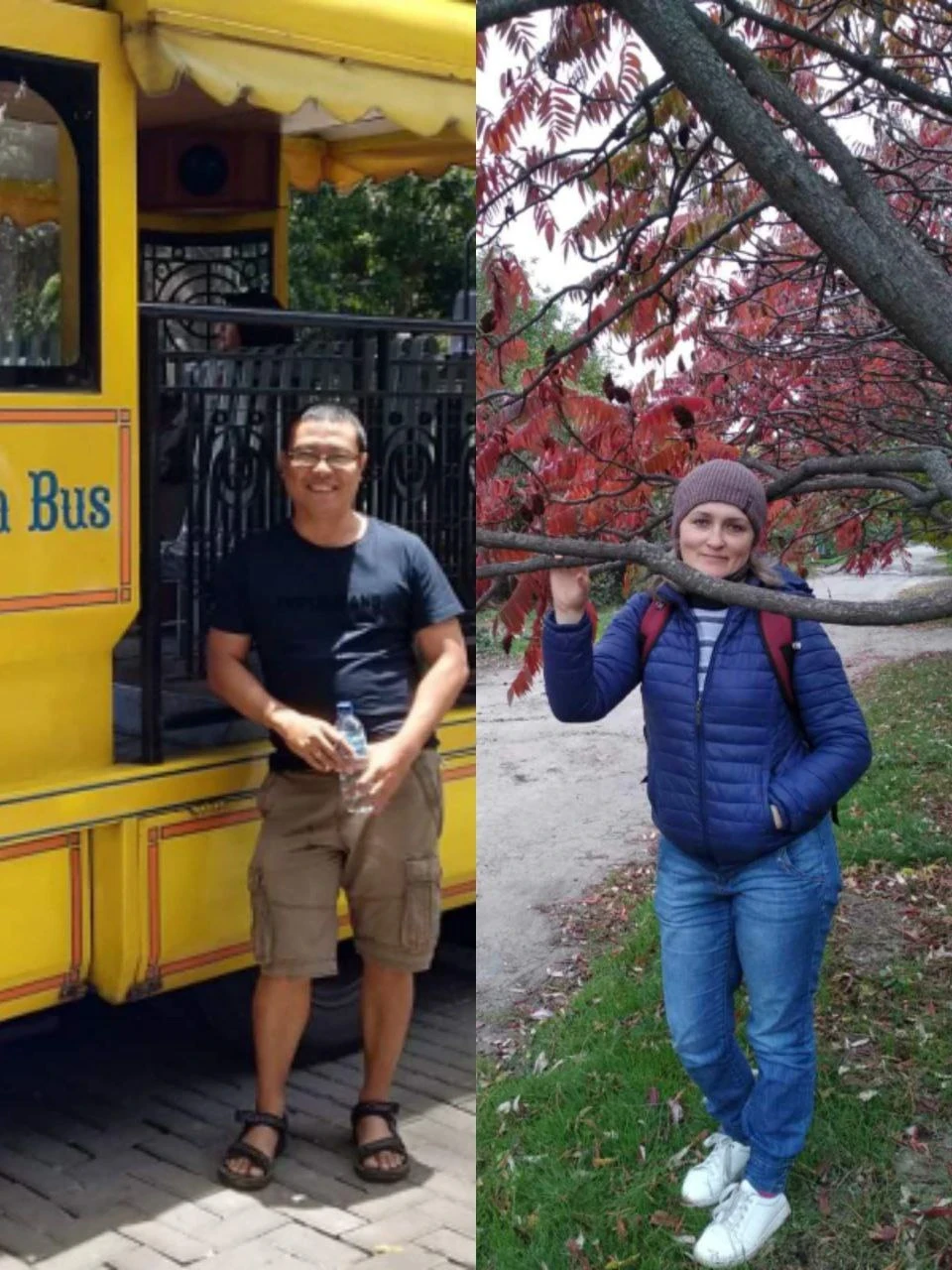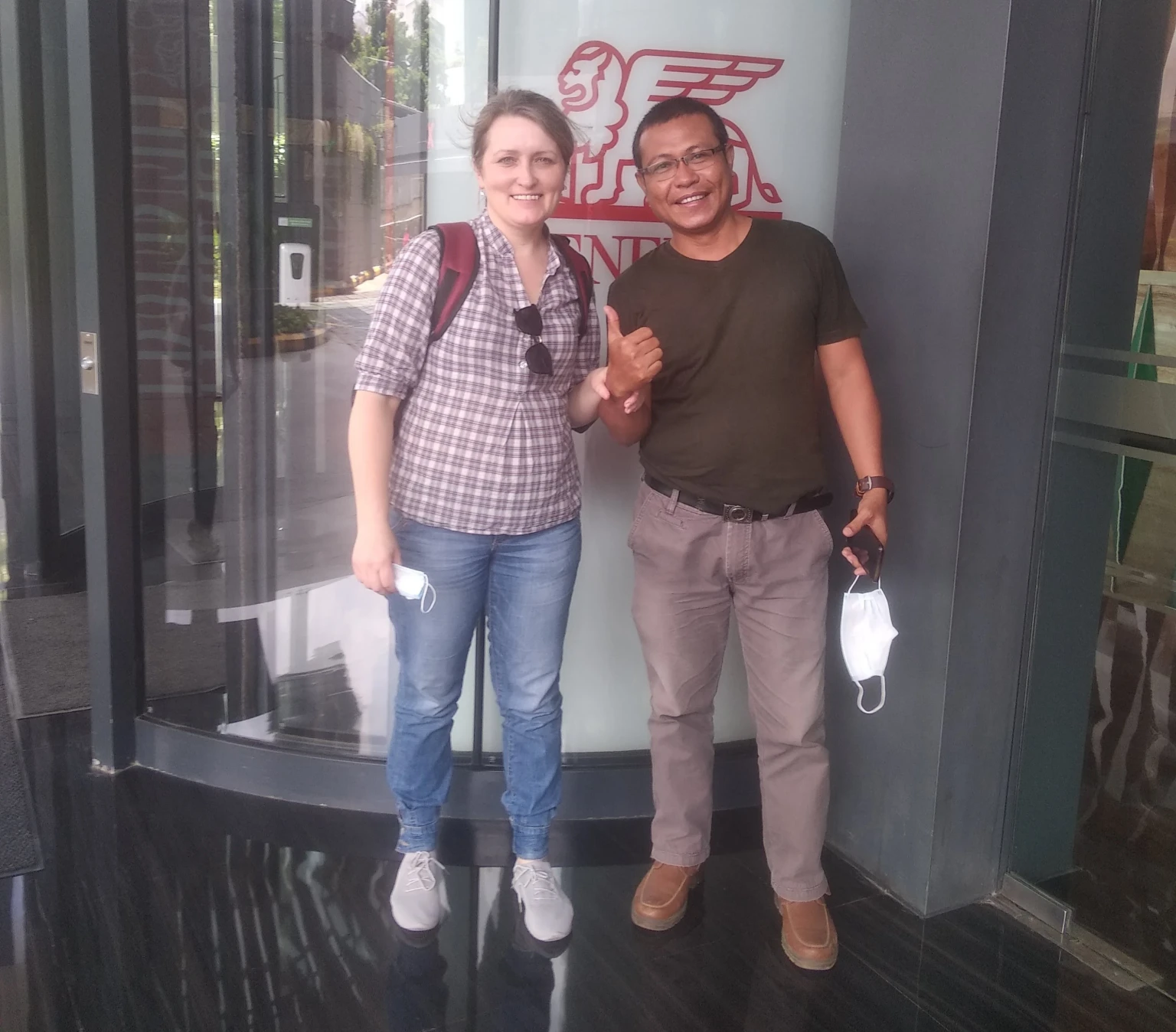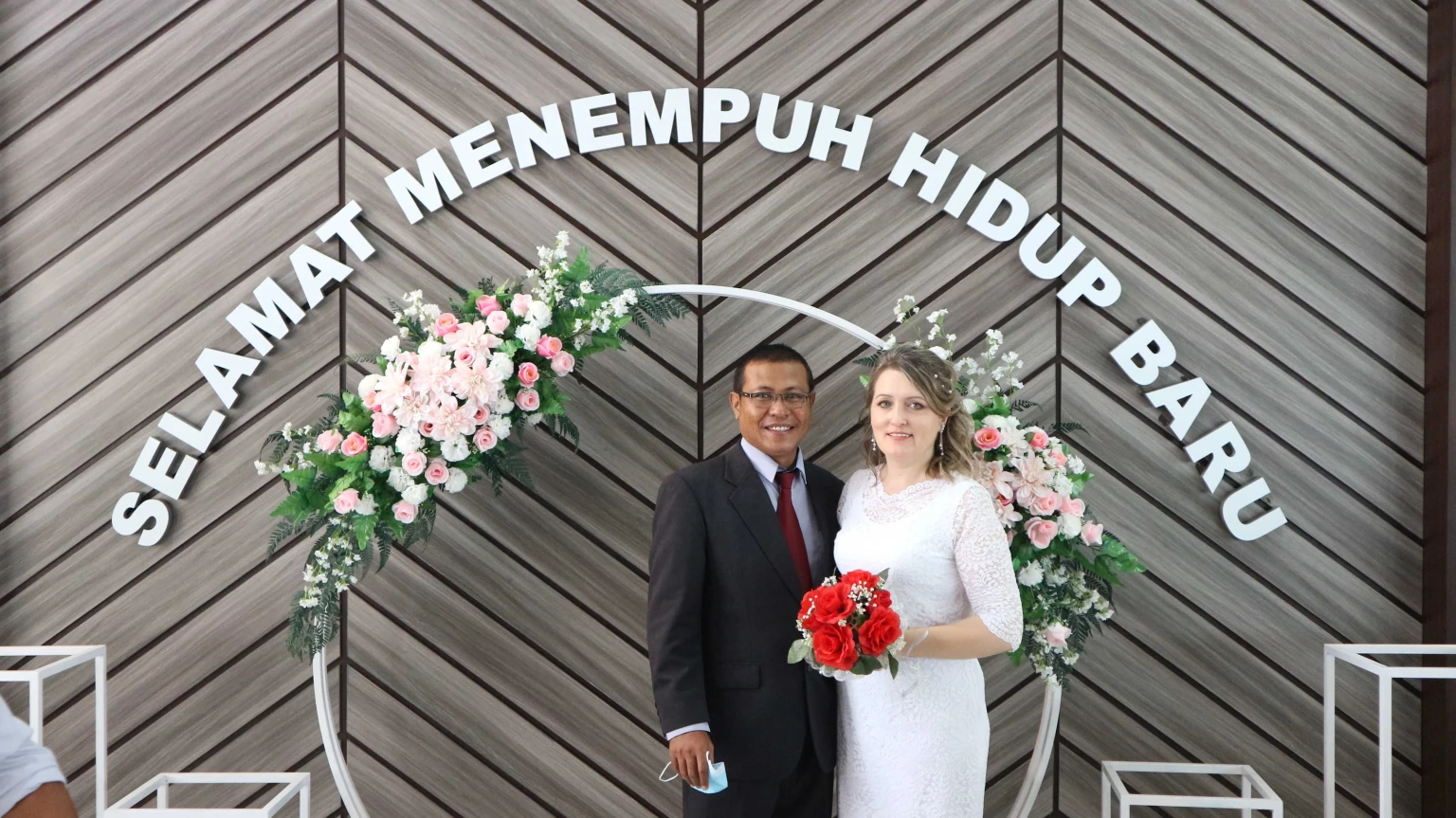In Indonesia, love stories often transcend cultural and religious
boundaries, reflecting the country’s rich diversity. As global connections
strengthen, relationships that cross national borders are becoming increasingly
common.
This article tells the story of a modern relationship that began online,
spanning continents, and blossomed in person in Indonesia. It highlights the
journey of navigating cultural and linguistic differences, demonstrating how
love can flourish despite these challenges. What started as a simple message
has grown into a testament to the power of commitment, patience, and
adaptability in a cross-cultural marriage.

Translated from the original article by Mila Soloman:
Love means something different to everyone. Some see it as a fairy-tale
romance, others as a fleeting emotion, and some don’t believe in it at all.
Personally, I believe love is real and can flourish with effort. It’s not just
about romance; it takes commitment and hard work from both sides, which
ultimately brings joy to every part of life.
Our love story is both simple and extraordinary, but it’s not a fairy
tale—it’s real. I’m not sharing this to convince anyone that love transcends
nationality, origin, or social status. I simply want to offer reassurance to
those who may feel disillusioned by relationships or have lost trust, as I once
did. I also want to share my experiences on how to adapt to each other’s lives,
understand each other’s cultures, and embrace each other’s habits.
I hope this honest account gives someone the confidence to believe that,
when the time is right, you will meet someone who truly values and loves
you—not just through words, but through actions. The key is not to rush but to
wait patiently. And that person doesn’t have to come from another culture (as
some might imagine, hoping that an exotic love will be perfect and
everlasting).
Love
sometimes comes from a direction we least expect. The key is not to overlook it but to remain open and attentive. Perhaps
the right person—a kind and devoted soul—is already near you. Whether they’re
from your home country or abroad, building a lasting love takes patience,
effort, forgiveness, and adaptability.
A brief glimpse into my past: From an early age, I
faced emotional and physical pain from a cruel father. My self-esteem hit rock
bottom under the weight of harsh words, beatings, and constant mockery. But I
made a choice—I refused to let bitterness, revenge, or cruelty shape me.
Forgiveness and kindness became my strength.
At 19, I rushed into marriage, driven by a desire
to escape my mother’s demands. I chose love, not logic, and unfortunately
encountered cruelty, indifference, and the worst of all, betrayal. After four
years, the marriage ended, but I was blessed with two wonderful children.
Though I had relationships after that, none brought the warmth or happiness I
sought—just more disappointment and unanswered questions. For 20 years, I
raised my children alone.
The scars of my past deeply affected my
self-esteem, and I stopped believing in the possibility of finding true, honest
love. By the time I turned 40, I thought it was too late to hope. But I was
wrong.
In April 2019, a man named Nova from Indonesia messaged me on Facebook,
politely inquiring about me and my family. Since I’m generally sceptical of
online dating, I responded cautiously, explaining that I wasn’t interested in
pursuing relationships online. We only exchanged a few words. To my surprise,
Nova was very understanding and didn’t push further or try to impose, which I
truly appreciated.
About a month later, when I heard about a tsunami
in Indonesia, I reached out to Nova out of concern to check if he and his loved
ones were safe. That simple gesture led us to start exchanging messages more
regularly. Our conversations felt natural, and over time, a mutual affection
began to develop. Despite this, I was hesitant to get too attached, worried
about the language barrier, cultural differences, and other challenges. For me,
committing to someone is a serious, lifelong decision, and I needed to be sure.
Despite my doubts, I decided to start learning
Indonesian, unsure if it would lead anywhere. But after a year, we were able to
communicate not just through text and Google Translate, but also through video
calls.
Over the course of nearly two
years, we took the time to get to know each other. I carefully observed Nova in
different situations, paying attention to his personality, how he interacted
with others, how he responded to challenges, and whether he was truly honest. I
had read advice on how to understand someone before marriage to avoid potential
mistakes, and I applied that knowledge as I got to know him, even from a
distance.
Although we dated entirely online and relied on Google
Translate, we still managed to form a deep connection. One day, I accidentally
called Nova while he was at the hospital. When I asked why, he explained that
he was caring for a bedridden friend as part of his regular duties. This
revealed the kindness in his heart. What touched me even more was his
honesty—right from the start, he didn’t try to impress me with his strengths.
Instead, he openly shared his struggles, flaws, and how he worked to overcome
them.
While it's true that you can't fully know someone from a
distance, when a relationship is built on honesty, forgiveness, and deep
affection—regardless of the circumstances—anything is possible!
A year later, my future husband bought me a plane ticket,
and I was preparing to travel to Indonesia. But then the pandemic hit
unexpectedly, and it was a shock—our hopes of meeting were suddenly dashed.
Still, we pulled ourselves together and patiently waited for the situation to
improve. Fortunately, Emirates froze my ticket as a voucher, which was a
relief—it meant the money wasn’t lost.
Nine months after the pandemic began, things started to
improve, and the airport reopened. We processed my visa in November through
Legal Indonesia. However, processing the remaining documents in
my home country took much longer than expected, and we worried that my visa would
expire before everything was ready. Miraculously, everything fell into place,
and I was able to fly out just three days before the visa expired.
I was anxious about how our first in-person meeting would
go. Would it feel the same as it did during our video calls? Despite my nerves,
I found comfort in everything I had learned about him over time.

I flew to Dubai, then on to Jakarta for the first time in my
life, feeling an unexpected calm, as if everything would be alright. Due to the
pandemic, the Indonesian government required all foreigners arriving in Jakarta
to take a test and quarantine for five days in one of the designated hotels.
Nova chose a more affordable option, Luminor (though to me, it felt more than
luxurious), which cost around 5 million rupiah for the five-day stay. So there
I waited for my beloved, feeling like a princess in a castle.
Our first meeting took place on the fourth day of my stay at
the hotel, when Nova arrived from Surakarta. The hotel staff didn’t allow him
to see me, as I still had to complete the five-day quarantine. So, we shared a
romantic moment from a distance—me at my hotel window on the seventh floor, and
Nova standing below, shining his phone's flashlight up at me.
The next morning, I was finally allowed to leave the hotel. Nova was waiting
downstairs, but in my nervous excitement, I got stuck in the elevator, unsure
which buttons to press, and ended up in the service basement. I had to video
call him for help to escape my "elevator prison." When we finally
met, I had mixed emotions, but he felt so familiar—like someone I had known for
ages. The next day, we travelled to Surakarta, gathered all the necessary
documents within a week, and a month later, we were married.

The first year of marriage was challenging; we had to learn how to truly
understand and live with each other. There were frequent misunderstandings,
different habits, and at times, we were overly critical of one another. All of
this strained our relationship. We soon realized that for our marriage to
thrive, we needed to let go of selfishness, negativity, sensitivity, and pride.
Instead, we focused on appreciating each other’s positive qualities and
cherishing every moment, knowing that we can’t predict what tomorrow holds.
Now, after 3.5 years of marriage, we’re still learning and adapting, but
we’ve seen our love deepen and our bond strengthen. What helps us? We turn
tense moments into humour, avoid sweating the small stuff, apologize quickly,
and communicate openly about our thoughts and feelings. We approach conflicts
calmly and live by wise principles rooted in pure and meaningful guidance.
I hope our love story inspires others to nurture their relationships,
believe in love, and live happily with someone, regardless of nationality.
To briefly summarize what to expect from an Indonesian husband, I’d say that
it’s possible to build a marriage regardless of racial differences, as all
people are part of one big family. However, just like in any family, each country
has its own culture, habits, and biases, and you need to be ready to adapt.
Indonesia has its unique mentality, culture, and deep connection to religious
rituals and traditions, so it’s essential to think carefully before deciding to
marry an Indonesian man.
Ask yourself: Am I ready to embrace this way of life? Can I accept his
culture, traditions, and religion? Do I have the patience to handle the
challenges that come with it?
It’s important to learn as much as possible about Indonesian life, so the
complexities of marriage don’t turn into stress instead of joy. For example,
don’t expect your husband to take the initiative in giving flowers or gifts. In
my experience, you may need to give a few hints. But
personally, I prefer a loving attitude over gifts or flowers—an attitude free
of harsh words or coldness. Of course, everyone’s mindset is different, but
generally, Indonesians are patient and tolerant, especially toward foreign
guests. They expect tourists to show respect and understanding for their way of
life. Indonesians are generally warm, friendly, and always smiling. However,
like everyone, they have their flaws—they can be direct, unpunctual, and
sometimes lazy. Some may even be overly frugal or easily offended.
Another important point is that many Indonesians dream of marrying wealthy
foreigners, so it’s crucial to understand their motives early on. That said,
not everyone is like that—my husband, for example, married me, a woman from a
modest background, purely out of love.
Ultimately, everyone chooses their partner for different
reasons. But the most important thing is to take the time to truly understand
the person—their character and whether there is genuine love—before committing
to marriage.
Translated from the original article by Mila Soloman.
You can add one right now!